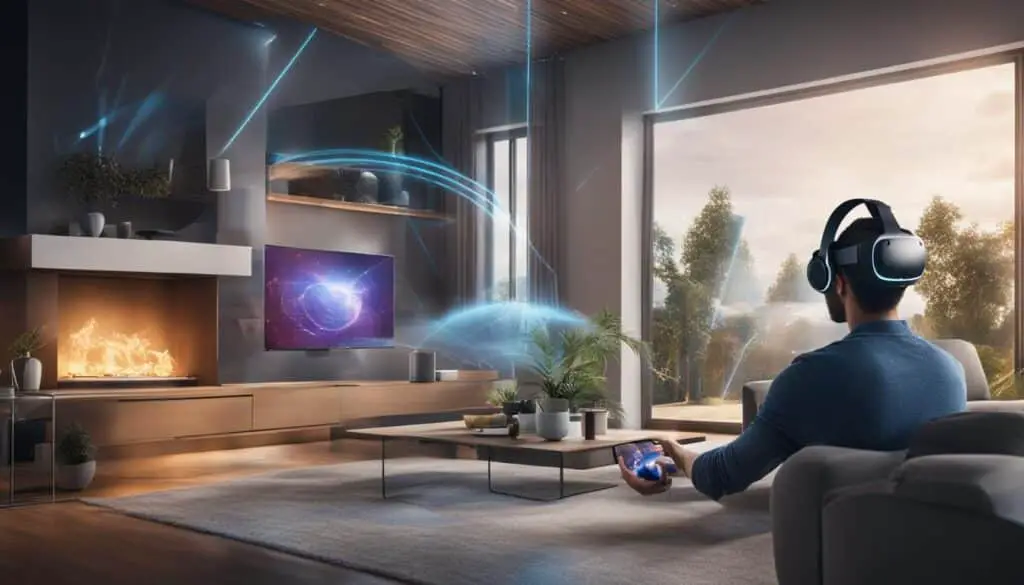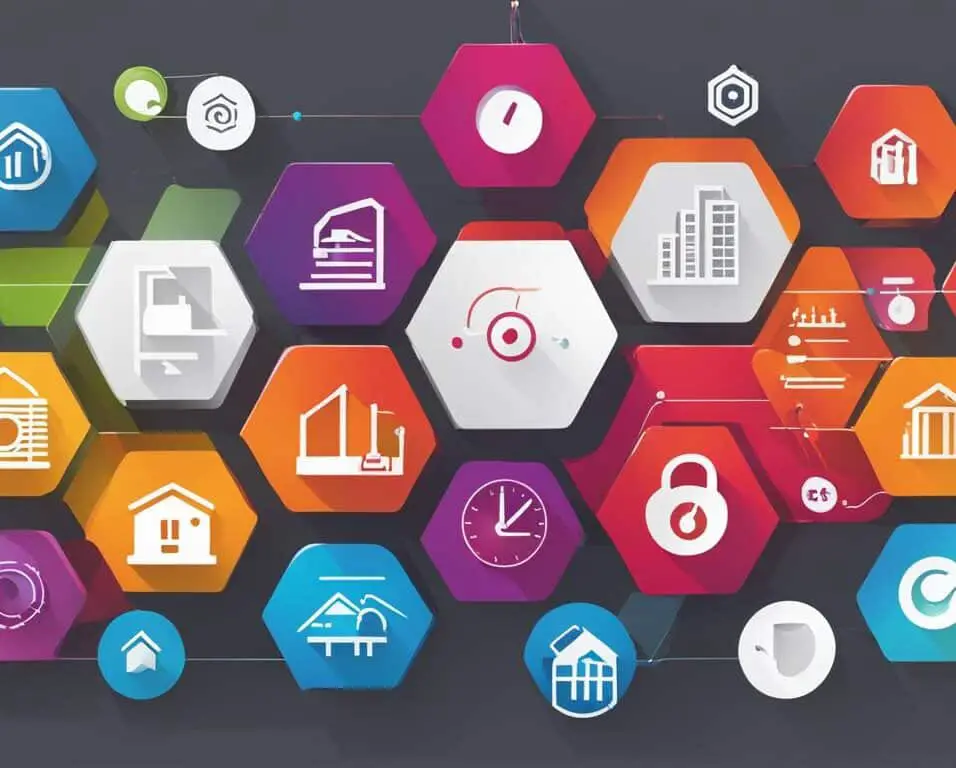Exploring the Future: AI in Home Automation
The integration of Artificial Intelligence (AI) into home automation systems has revolutionized smart homes. AI-powered smart homes are no longer a luxury but are increasingly becoming an integral part of modern living. This article explores how AI is transforming home automation and shaping the homes of the future. AI allows smart homes to learn, adapt, and make decisions based on data and user preferences, enhancing comfort, security, and efficiency.
Key Takeaways:
- AI-powered smart homes are transforming modern living, enhancing comfort, security, and efficiency.
- Smart homes integrate AI to learn, adapt, and make data-driven decisions based on user preferences.
- AI enables voice assistants, energy optimization, predictive maintenance, personalized experiences, and health monitoring in smart homes.
- The future holds even more exciting possibilities for smart homes, including interconnectivity, AI-powered robotics, sustainability, and enhanced virtual and augmented reality experiences.
- AI in home automation offers advantages such as convenience, efficiency, security, energy savings, and improved quality of life.
The Rise of Smart Homes
Smart homes have revolutionized the way we live, offering enhanced comfort, security, and efficiency in our living spaces. Through the integration of technology and home automation systems, smart homes have become intuitive and responsive, providing a seamless experience for homeowners.
One of the key drivers behind the advancement of smart homes is Artificial Intelligence (AI) technology. AI has taken the concept of home automation to a new level, allowing homes to learn, adapt, and make decisions based on data and user preferences. This has transformed the way we interact with our homes, making them more personalized and convenient.
AI-powered smart homes utilize machine learning algorithms to analyze data from various devices and systems, enabling them to understand user behavior and preferences. With this information, smart homes can automatically adjust settings, such as lighting, temperature, and music, to create the perfect ambiance based on the homeowner’s preferences.
AI technology allows smart homes to learn, adapt, and make decisions based on data and user preferences, revolutionizing the way we interact with our homes.
Additionally, AI technology plays a crucial role in enhancing home security. Smart homes equipped with AI-powered cameras and sensors can identify patterns, detect anomalies, and provide real-time alerts to homeowners, ensuring a safe and secure environment.
Moreover, AI-driven energy management systems optimize energy consumption in smart homes. By analyzing energy usage patterns, smart homes can automatically adjust lighting, heating, and cooling systems to reduce energy waste and save costs.
Overall, the rise of smart homes powered by AI technology has transformed the way we experience and interact with our living spaces. It has brought convenience, efficiency, and security to our fingertips, making everyday tasks easier and more enjoyable.
| Advantages of Smart Homes | Benefits of AI in Home Automation |
|---|---|
| 1. Increased comfort and convenience | 1. Personalized experiences based on user preferences |
| 2. Enhanced security through AI-powered surveillance | 2. Real-time alerts and notifications for improved home security |
| 3. Energy efficiency and cost savings | 3. Optimization of energy consumption for reduced waste |
| 4. Automation of routine tasks | 4. Time-saving through automation of everyday activities |
With AI at the helm, smart homes are paving the way for a more connected and intelligent future. As technology continues to evolve, we can expect even greater innovations and advancements in the realm of smart home automation.
AI and Home Automation
AI is revolutionizing the world of home automation, bringing unprecedented levels of convenience, efficiency, and personalization to smart homes. With the integration of Artificial Intelligence, voice assistants like Amazon’s Alexa, Google Assistant, and Apple’s Siri have become increasingly intelligent, enabling them to understand and respond to voice commands, making smart homes more accessible and user-friendly.
But AI’s impact goes beyond voice control. AI algorithms are used to optimize energy consumption in smart homes, leading to improved energy efficiency. Smart devices equipped with AI technology can learn user habits and automatically adjust settings to minimize energy wastage, resulting in lower utility bills and a more sustainable living environment.
Additionally, AI plays a crucial role in enhancing the security of smart homes. AI-powered cameras and sensors can detect anomalies and suspicious activities, providing real-time alerts to homeowners. With advanced facial recognition capabilities, AI can even differentiate between authorized individuals and potential intruders, adding an extra layer of security and peace of mind.
Another significant advantage of AI in home automation is the ability to enable predictive maintenance. By continuously monitoring the performance of various home systems and devices, AI algorithms can analyze data patterns, detect potential issues, and predict when maintenance or repairs may be required. This proactive approach helps prevent breakdowns, reduce repair costs, and extend the lifespan of appliances and equipment.
AI in home automation also opens up possibilities for highly personalized experiences. By analyzing user preferences and historical data, AI-powered smart homes can anticipate needs and tailor settings accordingly. Whether it’s adjusting lighting, temperature, or entertainment options, AI ensures that the living environment is perfectly suited to individual preferences, offering a customized and enjoyable experience.
Moreover, AI enables health monitoring capabilities in smart homes. With the integration of wearable devices and AI-powered sensors, individuals can track vital signs, sleep patterns, and overall well-being without leaving the comfort of their home. This data can be analyzed in real-time, providing valuable insights and early detection of potential health issues.
AI has become the driving force behind the evolution of smart homes, bringing forth a new era of convenience, energy efficiency, security, predictive maintenance, personalized experiences, and health monitoring.
| Benefits of AI in Home Automation | Keywords |
|---|---|
| Enhanced convenience and user-friendliness through voice assistants | Voice Assistants |
| Optimized energy consumption for improved energy efficiency | Energy Efficiency |
| Enhanced security through AI-powered cameras and sensors | Security |
| Predictive maintenance to prevent breakdowns and reduce repair costs | Predictive Maintenance |
| Personalized experiences tailored to individual preferences | Personalized Experiences |
| Health monitoring capabilities for improved well-being | Health Monitoring |
The Future of Smart Homes
The future of smart homes is incredibly promising, filled with innovative advancements that will further enhance our living spaces. With the continued integration of Artificial Intelligence (AI), smart homes will undergo significant transformations, bringing interconnectivity, AI-powered robotics, sustainability, and immersive experiences through virtual reality (VR) and augmented reality (AR). Let’s explore what lies ahead for the future of smart homes.
Greater Interconnectivity and Automation
AI will pave the way for seamless integration and automation between devices and systems within smart homes. This increased interconnectivity will enable smoother communication and coordination, allowing different components to work together harmoniously. Imagine your smart thermostat adjusting the temperature based not only on current weather conditions but also considering data from other devices, such as motion sensors that detect occupancy or even your personal preferences.
AI-Powered Robotics for Everyday Tasks
Robotic technology will play a more prominent role in smart homes of the future. AI-powered robots will assist in performing various everyday tasks, such as cleaning, maintenance, and even cooking. These robots will utilize sophisticated algorithms and machine learning capabilities to adapt to their surroundings, ensuring efficient and precise completion of tasks. With a robotic housekeeper taking care of mundane chores, you’ll have more time to focus on the things you love.
Achieving Sustainability through Advanced Systems
Sustainability will be a key focus in the future of smart homes. Advanced energy management systems will enable homeowners to optimize energy consumption, reducing waste and promoting environmentally friendly practices. Water conservation will also be a priority, with smart homes utilizing sensors and AI algorithms to monitor water usage and minimize wastage.
To illustrate the impact of sustainability in the future of smart homes, consider the following table that highlights the potential energy savings:
| Energy-Saving Measures | Estimated Energy Savings |
|---|---|
| Smart thermostats and HVAC optimization | Up to 20% reduction in heating and cooling energy consumption |
| Solar panels integrated with AI algorithms | Significant decrease in reliance on traditional energy sources |
| Smart lighting systems with occupancy sensors | Up to 50% reduction in lighting energy consumption |
| Water flow monitoring and leak detection | Prevention of water wastage through real-time monitoring |
Immersion through Virtual Reality and Augmented Reality
Virtual reality (VR) and augmented reality (AR) will revolutionize how we interact with our homes. VR experiences will transport us to entirely different realms within our living spaces, while AR will overlay digital information onto the physical environment, enhancing our understanding and engagement. Imagine touring a potential home before making a purchase decision, all from the comfort of your living room, thanks to immersive VR technology.
Below is an image illustrating a virtual reality experience in a smart home:

The future of smart homes is filled with possibilities that will reshape the way we live, emphasizing convenience, efficiency, and sustainability. As AI continues to advance, smart homes will become more interconnected, robotic assistants will become commonplace, sustainability practices will be prioritized, and immersive experiences will be at our fingertips through VR and AR.
AI in Home Automation: Advantages and Benefits
The integration of AI into home automation systems brings numerous advantages and benefits to smart homes. The combination of AI and home automation enhances convenience, efficiency, security, and energy savings, providing a seamless and intelligent living experience.
One of the key advantages of AI in home automation is its ability to enable voice assistants and natural language processing, making controlling devices effortless. With voice commands, homeowners can easily control various aspects of their smart homes, from adjusting the lighting and temperature to playing music or even ordering groceries online.

AI also optimizes energy consumption in smart homes, leading to energy savings. AI algorithms analyze data from various sensors and devices to determine the most efficient ways to use energy. For example, AI can adjust the thermostat based on occupancy patterns, ensuring heating or cooling is only active when needed, resulting in reduced energy waste and lower utility bills.
In terms of security, AI-driven systems provide real-time alerts and enhance home security. By leveraging AI-powered cameras, sensors, and facial recognition technology, smart homes can detect and recognize potential threats, such as intruders or unauthorized access. Homeowners receive instant notifications on their smartphones, enabling them to take immediate action and maintain the safety of their homes.
Another significant benefit of AI in home automation is predictive maintenance. Through continuous monitoring and analysis of data, AI can identify potential issues or system failures before they occur. By detecting early warning signs, AI-powered smart homes can schedule timely maintenance, preventing costly breakdowns and ensuring the longevity of devices and systems.
AI in home automation also provides personalized experiences and health monitoring. AI-powered smart homes can learn and adapt to individual preferences, such as adjusting lighting, temperature, and music based on personal preferences and habits. Additionally, AI can monitor various health metrics, such as sleep patterns or heart rate, and provide insights and recommendations to improve overall well-being.
| Advantages | Benefits |
|---|---|
| Enhanced convenience | Effortless control through voice commands |
| Improved efficiency | Optimized energy consumption and reduced utility bills |
| Enhanced security | Real-time alerts and increased home security |
| Predictive maintenance | Prevention of costly breakdowns and system failures |
| Personalized experiences | Adjustment of settings based on individual preferences |
| Health monitoring | Insights and recommendations for improved well-being |
AI in Smart Homes: The Impact on Daily Life
AI technology has revolutionized the way we live in smart homes, making our daily lives more connected, convenient, and efficient. By enabling seamless connectivity between devices and systems, AI creates a centralized control hub that simplifies automation and enhances the overall smart home experience.
Imagine waking up to an AI-powered home that has already adjusted the temperature, lighting, and music to match your preferences. As you go about your day, AI learns from your behaviors and adapts to provide personalized comfort and convenience. Whether it’s automatically adjusting the blinds for optimal sunlight or brewing your favorite coffee before you even step into the kitchen, AI-powered smart homes make everyday tasks effortless.
“AI-powered smart homes make everyday tasks effortless.”
AI-driven devices and systems streamline daily routines, saving you time and effort. From voice-controlled assistants that can answer questions, manage your schedule, and control compatible devices, to smart appliances that can anticipate your needs and adjust settings accordingly, your daily life becomes more efficient and hassle-free.
But the impact of AI in smart homes goes beyond convenience. It also enhances energy efficiency, helping you reduce your carbon footprint and save on utility bills. AI algorithms analyze data from sensors and devices to optimize energy consumption, automatically adjusting lighting and temperature based on occupancy and preferences. This not only reduces energy waste but also creates a more sustainable living environment.
The convenience and efficiency provided by AI in smart homes extend to the realm of security as well. AI-powered security systems utilize intelligent cameras and sensors to detect and analyze potential threats, providing real-time alerts and ensuring the safety of your home and loved ones. With AI, you can have peace of mind knowing that your smart home is constantly monitoring and protecting your property.
AI in Smart Homes: Enhancing Connectivity and Convenience
One of the key benefits of AI in smart homes is its ability to create a connected ecosystem. With AI as the backbone, different devices and systems seamlessly communicate and integrate, enabling centralized control and automation. This means you can control multiple devices and systems with a single command or through a mobile app, making it easier than ever to manage your smart home.
Through AI, smart homes can learn from your habits and routines, anticipating your needs and providing a personalized experience. For example, AI can automate your morning routine by adjusting the lighting and playing your favorite music as you wake up. It can also integrate with your calendar and automatically remind you of important events or tasks throughout the day. The more AI learns about your preferences, the more it can tailor your living environment to your liking.
AI-Enabled Devices and Systems in Smart Homes
| Device/System | Functionality |
|---|---|
| Voice Assistants | Respond to voice commands, control devices, and provide information |
| Smart Thermostats | Optimize temperature settings based on occupancy and preferences |
| Smart Lighting | Adjust lighting intensity and color temperature to enhance ambiance and energy efficiency |
| Smart Security Systems | Monitor and protect your home through intelligent cameras and sensors |
| Smart Appliances | Anticipate needs and adjust settings for enhanced convenience and efficiency |
As AI continues to advance, the impact on daily life in smart homes will only grow stronger. With the power of AI, smart homes are transforming the way we live, offering a new level of connectivity, convenience, and efficiency that enhances our everyday experiences.
AI-Enabled Smart Home Products and Innovations
The market is abuzz with an array of innovative AI-enabled smart home products that cater to the diverse needs of homeowners. These cutting-edge advancements bring convenience, efficiency, and an enhanced living experience to every aspect of our homes. Let’s explore some of the remarkable AI-powered innovations that are transforming the way we live.
Smart Mirror with AI Assistant
Imagine waking up to a personalized mirror that not only reflects your image but also acts as a virtual assistant. AI-enabled smart mirrors use facial recognition technology to provide you with customized reminders, notifications, and even fashion advice. With voice commands, you can control other smart devices in your home, check the weather, and receive updates on your schedule.
Robotic Chef Assistant
Meet your new culinary partner – the robotic chef assistant. These intelligent kitchen helpers are equipped with AI algorithms that enable them to assist you in cooking tasks. From chopping and stirring ingredients to following voice commands, they take the hassle out of meal preparation. With built-in recipes and step-by-step instructions, they help you achieve professional-level cooking results.
Smart Controller for Pets and Plants
Keeping your furry friends and plants happy and healthy is made easier with AI-enabled smart controllers. These devices use data from experts to create an optimal environment for your pets and plants. They monitor factors like temperature, humidity, and light levels, adjusting them accordingly to ensure your pets and plants thrive. You can also receive notifications and insights regarding their well-being through connected apps.
These remarkable AI-enabled smart home products exemplify the power of AI in revolutionizing our living spaces. They seamlessly integrate into our homes, streamlining daily tasks, and enhancing our overall lifestyle.
Conclusion
The integration of AI into home automation has revolutionized the concept of smart homes. AI-powered smart homes offer a wide range of benefits that enhance our everyday lives. With AI, smart homes provide us with convenience, efficiency, security, energy savings, and personalized experiences.
As AI technology continues to advance, the future of smart homes holds even more exciting possibilities. We can expect greater interconnectivity between devices and systems, seamless automation, and AI-driven robotics that perform various tasks like cleaning and maintenance.
Embracing AI in home automation is not just a trend but a fundamental shift in how we envision and experience the concept of home. The smart homes of the future will revolutionize the way we live, making our lives easier, more comfortable, and more sustainable. With AI-powered smart homes, our quality of life will significantly improve, and we will truly experience the incredible potential of technology in our everyday lives.
FAQ
What is smart home automation?
Smart home automation refers to the use of technology to connect and control various devices and systems within a home. It allows for seamless control, automation, and customization of features such as lighting, security, temperature, entertainment, and more.
How does AI integrate with home automation systems?
AI, or Artificial Intelligence, plays a crucial role in home automation systems. It enables devices and systems to learn, adapt, and make decisions based on data and user preferences. AI technology powers voice assistants, optimizes energy consumption, enhances security, enables predictive maintenance, creates personalized experiences, and monitors health and wellness in smart homes.
What are the advantages of AI in home automation?
The integration of AI into home automation systems offers numerous advantages. It enhances convenience by enabling voice control and centralized automation. AI optimizes energy consumption, leading to energy savings. It also provides enhanced security through real-time alerts and predictive maintenance, preventing breakdowns. AI in home automation creates personalized experiences and improves overall quality of life.
How does AI impact daily life in smart homes?
AI technology has a significant impact on daily life in smart homes. It enables seamless connectivity between devices and systems, allowing for centralized control and automation. AI-powered smart homes learn and adapt to user preferences, providing convenience and efficiency in daily tasks and routines. AI-powered devices and systems streamline daily life, making it easier and more enjoyable.
What are some AI-enabled smart home products and innovations?
The market is flooded with AI-enabled smart home products and innovations. Examples include smart mirrors with AI assistants that provide personalized reminders and notifications, robotic chef assistants that can perform cooking tasks and follow voice commands, and smart controllers for pets and plants that create the perfect environment for their well-being based on expert data.
What does the future hold for smart homes and AI?
The future of smart homes holds exciting possibilities. AI will enable greater interconnectivity between devices and systems, allowing for seamless integration and automation. AI-powered robotics will become more commonplace, performing tasks like cleaning and maintenance. Smart homes will become more sustainable through advanced energy management systems and water conservation. Enhanced virtual reality (VR) and augmented reality (AR) experiences will transform how we interact with our homes.
Why is AI in home automation important for the future?
Embracing AI in home automation is not just a trend but a fundamental shift in how we envision and experience the concept of home. AI-powered smart homes offer numerous benefits, including convenience, efficiency, security, energy savings, and personalized experiences. As AI technology continues to advance, the future of smart homes will enhance our quality of life and revolutionize the way we live.








